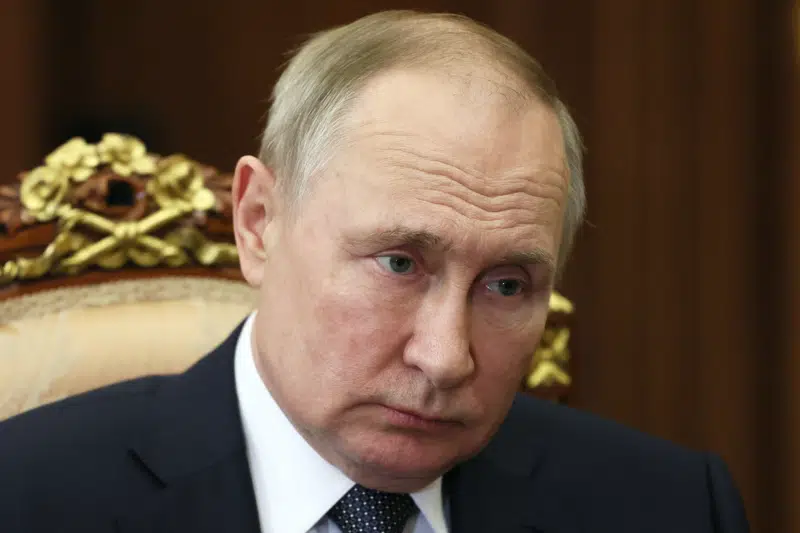Russian President Vladimir Putin will not be holding his annual year-end marathon news conference this month amid the war in Ukraine, a break in the long-held tradition that observers have attributed to the Kremlin’s uneasiness about a string of battlefield setbacks.
Kremlin spokesman Dmitry Peskov confirmed Monday that Putin wouldn’t hold the annual news conference for the first time in 10 years. He didn’t comment on the reason behind it, but many commentators attributed it to the Russian leader’s reluctance to face unpleasant questions about what he calls Russia’s “special military operation” in Ukraine.
The annual news conference has been used by the Kremlin to polish Putin’s image. The tightly stage-managed show televised live lasted for up to 4 1/2 hours and featured Putin talking about a wide range of domestic and foreign policy issues.
Political analyst Abbas Gallyamov said in a video commentary that Putin cancelled the annual news conference because “he has nothing to say from the point of view of strategy.”
“The press conference has become a significant fixture in Putin’s calendar of public engagement and has frequently been used as an opportunity to demonstrate the supposed integrity of Putin,” the U.K. Defense Ministry said in a commentary on Twitter.
“Although questions are almost certainly usually vetted in advance, the cancellation is likely due to increasing concerns about the prevalence of anti-war feeling in Russia,” it said. “Kremlin officials are almost certainly extremely sensitive about the possibility that any event attended by Putin could be hijacked by unsanctioned discussion about the ‘special military operation.’”
Putin ordered the invasion of Ukraine on Feb. 24, saying that it’s aimed to “demilitarize” and “denazify” the country, citing NATO’s refusal to offer Russia guarantees that Ukraine wouldn’t be invited to join the alliance. Ukraine and much of the world denounced the Russian attack on its neighbor as an unprovoked act of aggression.
Putin and his officials hoped to rout the Ukrainian military in a few days, but a fierce Ukrainian resistance quickly derailed those plans. After a botched attempt to quickly capture the Ukrainian capital, the Russian troops pulled back from areas around Kyiv in March.
In September, Ukraine won back large swaths of land in the northeastern Kharkiv region, and last month it reclaimed control of the strategic southern port city of Kherson.
A mobilization of 300,000 reservists that Putin ordered in September so far has failed to reverse battlefield fortunes for Russia. The mobilization order has prompted hundreds of thousands of Russians to flee abroad to avoid recruitment, and those who have been called up reported glaring shortages of key equipment and supplies.
In a rare acknowledgement last week that the campaign in Ukraine is taking longer than he anticipated, Putin admitted that wrapping up his “special military operation” could be a “lengthy process.” At the same time, he continued to claim that the campaign was going according to plan and will achieve its goals.ADVERTISEMENT
The Kremlin has muzzled any criticism of its action in Ukraine from the liberal anti-war camp, shutting critical media outlets and criminalizing the spread of any information that differs from the official view. But it has faced an increasingly vocal criticism from Russian hardliners who have denounced the president as weak and indecisive and called for ramping up strikes on Ukraine.
Amid a string of military setbacks in Ukraine, Putin spiked another annual fixture, a televised call-in show in which he takes questions from the public to nurture his father-of-the-nation image.
Putin also so far has failed to deliver the televised state-of-the-nation address to parliament, a speech he’s obliged by the country’s constitution to deliver each year.
The Kremlin hasn’t set a date for Putin’s address.
AP

